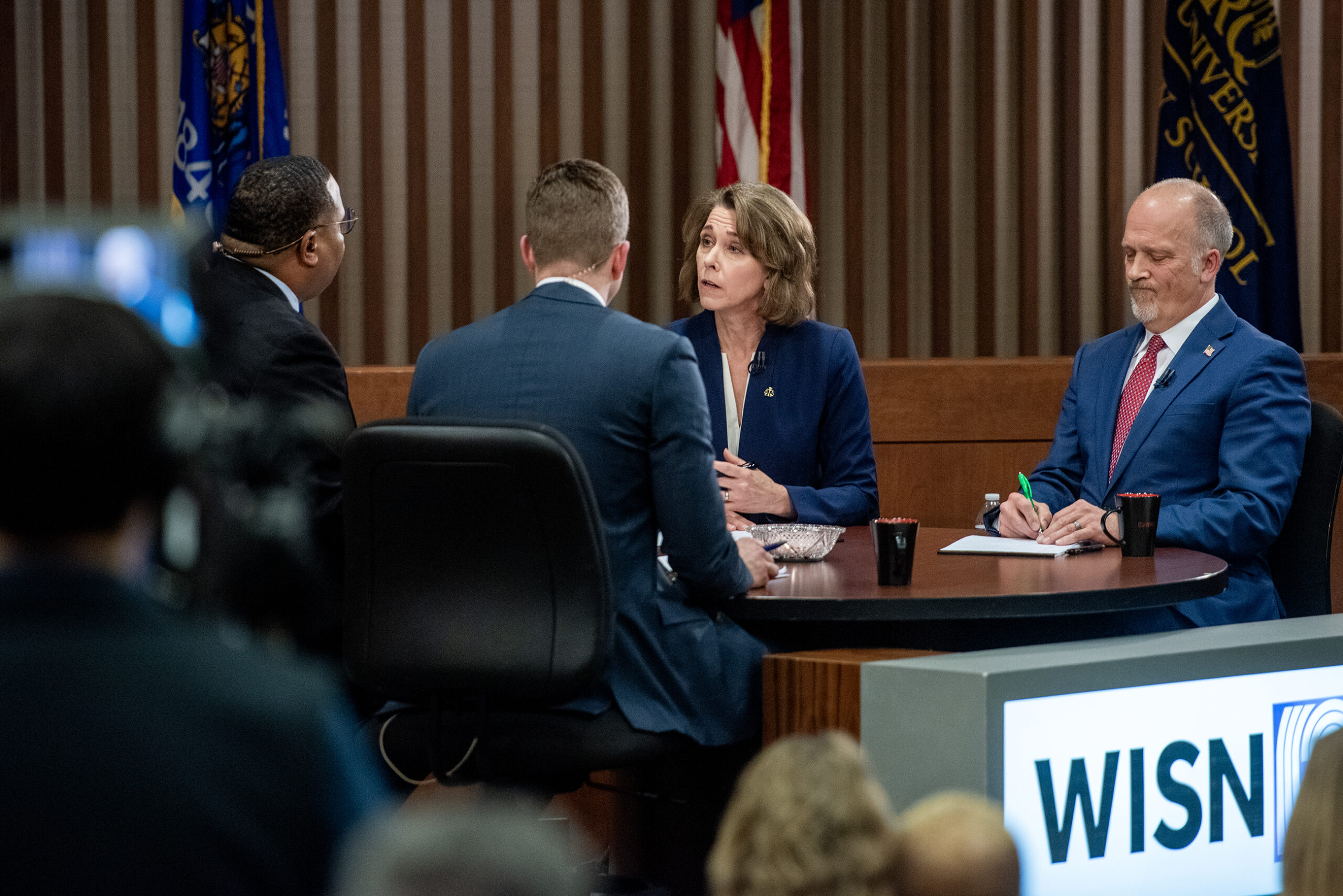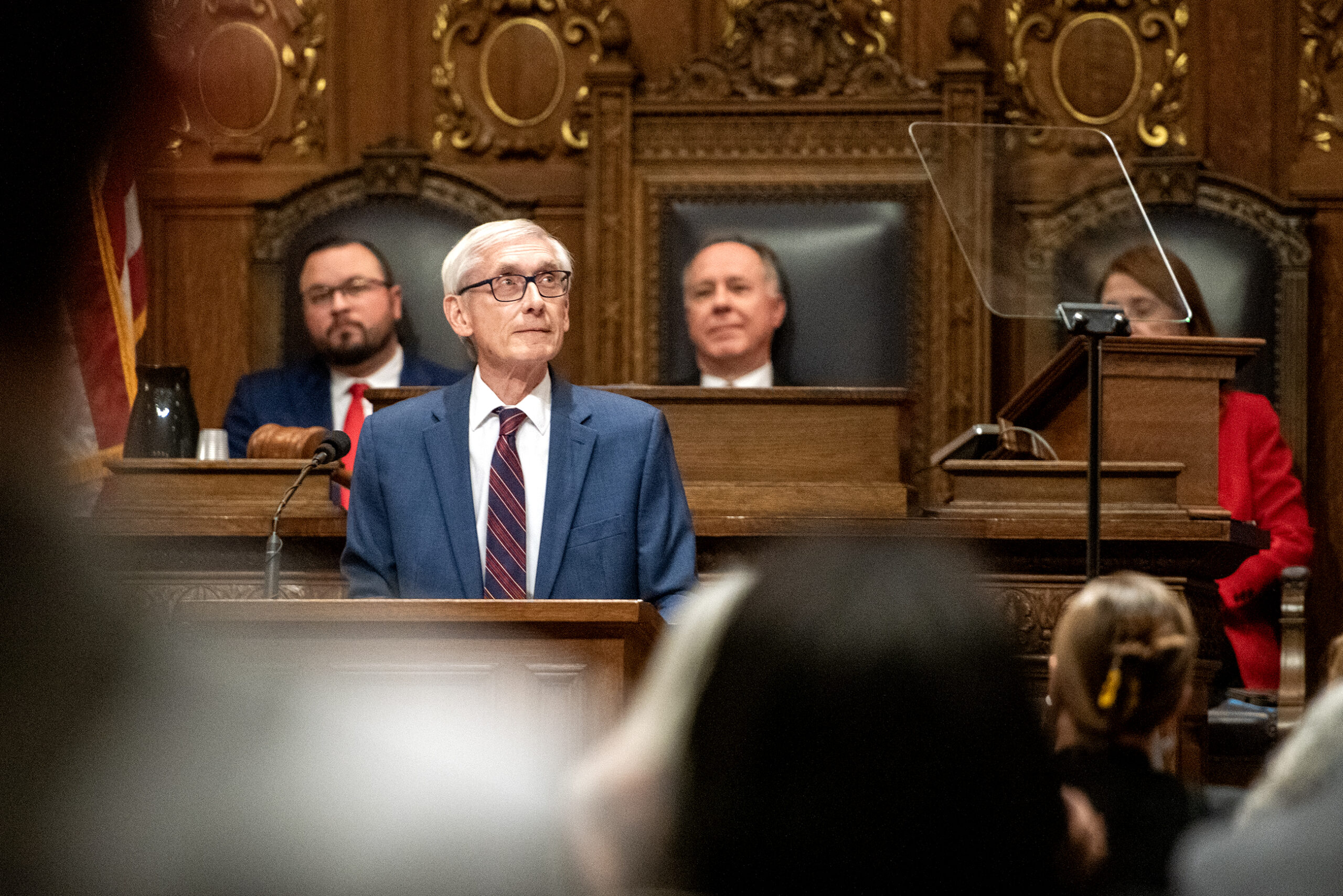Gov. Tony Evers has vetoed a set of legislative maps passed by Republican state lawmakers, likely leaving an ongoing dispute over redistricting in the hands of the Wisconsin Supreme Court.
Republicans based the maps on those Evers submitted to the Wisconsin Supreme Court, but they made a handful of changes to prevent GOP incumbents from being drawn out of their current districts.
In his veto message to Republican lawmakers, Evers called the Republican maps “gerrymandered” to protect GOP incumbents and said the “rushed process” lawmakers used to pass them within a 24-hour period resulted in two state Assembly districts that include “non-contiguous territory in violation of our State Constitution.” The contiguity issue was the basis for the Wisconsin Supreme Court declaring GOP-drawn voting districts used in recent elections unconstitutional on Dec. 22.
Stay informed on the latest news
Sign up for WPR’s email newsletter.
“Wisconsinites want and deserve maps that support a robust, healthy, and deliberative democracy in which elected officials are responsive to their communities and constituents and must work to earn the support and the votes of the people they serve,” Evers said. “Assembly Bill 415, in stark contrast, aims to serve the elected officials who voted for those maps. Protecting incumbents is neither what Wisconsin law priorities nor requires — and for good reason.”
The veto wasn’t a surprise, but it means the Democratic governor and Republican-controlled state Legislature aren’t likely to agree on voting maps before the Wisconsin Supreme Court’s liberal majority picks new legislative districts.
Republicans could try to override Evers’ veto, but they likely lack the numbers. The maps passed the Senate 17-14 and passed the Assembly 63-35. Both margins are short of the two-thirds majority needed for a veto override.
A statement from Assembly Speaker Robin Vos, R-Rochester, accused Evers of vetoing “the maps that were largely what he proposed,” suggesting that the governor “would have gotten 99.7%” of what he wanted by signing the GOP plan.
“His action today only solidifies his trust in the Wisconsin Supreme Court to give him even more partisan, gerrymandered maps for Democrats—the very thing the court’s newest justice promised on the campaign trail while receiving record-level Democratic Party campaign donations,” Vos said.
Vos and other Republican lawmakers previously called on newly elected liberal Supreme Court Justice Janet Protasiewicz to recuse herself from the redistricting lawsuit or face potential impeachment because of comments she made about current GOP-drawn legislative maps being “rigged” during her campaign. Protasiewicz refused to step aside, stating she was not prejudging the case, but rather was expressing her personal values. Since then, Vos has backed away from the impeachment threats but said the option is still on the table.
State Senate Majority Leader Devin LeMahieu, R-Oostburg, released his own statement claiming Evers vetoed maps that were nearly identical to the ones the governor submitted to the court aside from changes to undo “a small handful of the Governor’s most egregious incumbent gerrymanders.”
“Instead he vetoed his own maps because he is confident that the Wisconsin Supreme Court will trample the constitutional authority of the legislature,” LeMahieu said.
Two redistricting experts hired by the court’s liberal 4-3 majority are currently reviewing map proposals submitted by parties to a redistricting lawsuit, which resulted in current GOP-drawn districts being declared unconstitutional in late December.
In its Dec. 22 ruling striking down Wisconsin’s current, Republican-drawn maps, the Supreme Court said the primary responsibility for redistricting falls to the Legislature. But the court said if lawmakers and Evers cannot agree on new maps, it “will proceed toward adopting remedial maps.”
There were six map proposals submitted by Evers, the Legislature, a group of mathematicians, Democratic state senators, the conservative Wisconsin Institute for Law and Liberty and Democratic voters who filed the redistricting lawsuit. Each party filed legal briefs arguing their maps best met redistricting criteria outlined by the court. Those include constitutional requirements that legislative districts be compact, include similar populations and have boundaries that physically connect. The court’s liberal majority said it will also consider the “partisan impact” of any map submissions.
There are several ways partisan impact has been measured in legal battles over redistricting around the nation. After striking down Wisconsin’s GOP-drawn legislative districts, the Supreme Court hired University of California, Irvine Political Scientist Bernard Grofman and Carnegie Mellon University Political Scientist Jonathan Cervas to serve as consultants.
The two are scheduled to issue a report Thursday laying out how well the map proposals mesh with the court’s order. If Grofman and Cervas find the parties’ maps don’t meet the court’s guidelines, they will be tasked with drawing their own remedial Assembly and Senate maps for justices to consider.
Most of the maps submitted to the court are projected to decrease Republican margins in the Legislature, and some could give Democrats a shot at winning legislative majorities.
Wisconsin Public Radio, © Copyright 2025, Board of Regents of the University of Wisconsin System and Wisconsin Educational Communications Board.





